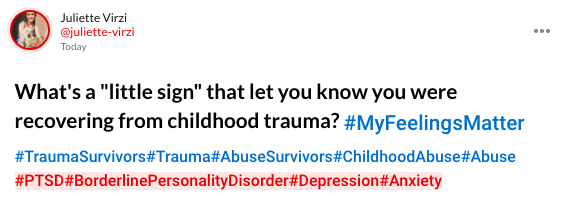17 'Little Signs' You May Not Realize Mean You're Recovering From Childhood Trauma
Feel less alone
Get our helpful emails
Trauma recovery often comes in waves — especially if you are recovering from childhood trauma. Though recovery is complex, sometimes on our journeys we notice little things that remind us we’re moving forward and healing. Because of this, we asked our Mighty community of #TraumaSurvivors to share with us the little “signs” that let them know they were healing from childhood trauma.
Wherever you are in your own recovery, please remember your experiences are valid and you deserve support.
Here’s what our community shared with us:
- “For me the realization came while working an outdoor event behind a grill with our executive chef. He put his arm around behind me and reached over my shoulder to reach the thermometer in my pocket. He hadn’t ask for permission or said anything about what he was intending to do but as it was happening, there was no anxiety, suspicion, tell-tale flinch, panic or need to protect myself. The absence of 22 years of PTSD triggers in that moment was inexplicably beautiful. Feeling safe and knowing I was able to trust my judgment and senses for the first time in such a long time was the first day of life with a new story to tell.” — Jennifer L.
- “I am now able to identify when I disassociate. Or when I’m not present. And the step I’m working on now is [finding] ways to bring me back into my body and be present again.” — Kristy G.
- “My recovery is not linear but for me looks like being able to enjoy things I once avoided because I associated it with childhood trauma. Something as small as Cheeto puffs.” — Niki S.
- “I finally found the words to be able to describe what happened and I’m able to talk about it — rather than being at a loss for words and only feeling the things I couldn’t speak up about anymore.” — Tatauq M.
- “I knew I was starting to heal when I decided to pick up a paint brush for the first time. Full of fear and anxiety, I pushed through and began painting my feelings onto the canvas in front of me. I was filled with every ‘stressful’ emotion possible, my heart racing and tears flowing. Abusers talking in my head telling me I’m no good — especially at art. This was a pivotal moment in my life. I tear up every time I even think about that moment. As I looked at my final piece, I saw my own truths staring back at me. Mourning over my childhood and forgiving myself through my art was one of the most empowering moments in my life. For the first time ever I not just accepted, but believed the sexual and physical abuse was not my fault and I never deserved it. From that moment on, I was finally able to breathe and to heal.” — Zaleta M.
- “Starting to set healthy boundaries.” — Tanja B.
- “Mine was walking out into my living room one day and finally feeling safe. I didn’t feel the need to have to worry about what I wore or who was gonna say something about my looks. I wasn’t worried about someone pointing out the fact that I had finally gotten out of bed that day. I’m not fully recovered or healed but I know I’m headed that way in the end.” — Lille H.
- “I’m still a work in progress, but I’ve finally let go of the hate and resentment I’ve had towards both of my parents. I now recognize that hating them for their flaws and the way they abused me will not make me better. I can’t have a relationship with either of them, at least for right now, but that’s OK. I accept that. They are troubled adults who never sought help for themselves, and in turn, projected their issues onto me. It’s not acceptable by any means, but I can’t let their mistreatment of me in the past derail my promising future as a successful, healthy and loving adult.” — Lauren G.
- “I can finally talk about it openly without crying, and simply just breaking down. I can finally realize I’m better now than I was before…” — Meghan Y.
- “I don’t constantly look up my old stepfather (my abuser) online to find out what his life is like. I just don’t care as much as I used to.” — Megan M.
- “I stopped thinking about my father, who was my abuser. I used to dwell on everything and think about the abuse every day. I was obsessed. Eventually, days would pass without thinking about it and now it only crosses my mind occasionally. When it does go through my head, I am not emotionally attached to my thoughts anymore.” — Dani P.
- “I stopped intentionally isolating myself.” — Monica S.
- “When I accepted dialectical behavior therapy (DBT) and mindfulness into my life, my nightmares and hopelessness decreased. I have not been hospitalized since.” — Jenn M.
- “For me it happened during my counseling years. I would have very vivid repetitive dreams every night over and over again. My councilor and I figured it was my body finally trying to heal itself subconsciously.” — Samantha H.
- “I stand up for myself now when I get mistreated/disrespected by a lover.” — Tiffany S.
- “I started to let go of the false sense of control I had. I realized I couldn’t control my past, but I was the only one who could control my future. I can’t control if someone wants to abandon me, but I can choose not to push other people away because of it. I can’t control the hurtful things people do, but I can control whether I let them in my life or not. I can’t control how much someone loves me, but I can control how much I love myself.” — NyAmber G.
- “When I finally ‘joined in’ in college. I joined the newspaper and learned to really open up and communicate. It was so impactful that I got a degree in Mass Communication — something I never could have imagined when I was younger.” — Sarah F.
What’s a “little sign” that let you know you were recovering from childhood trauma? Join the conversation below.
Read the responses, and reply yourself.
Getty Images photo via Grandfailure
Originally published: November 14, 2018


